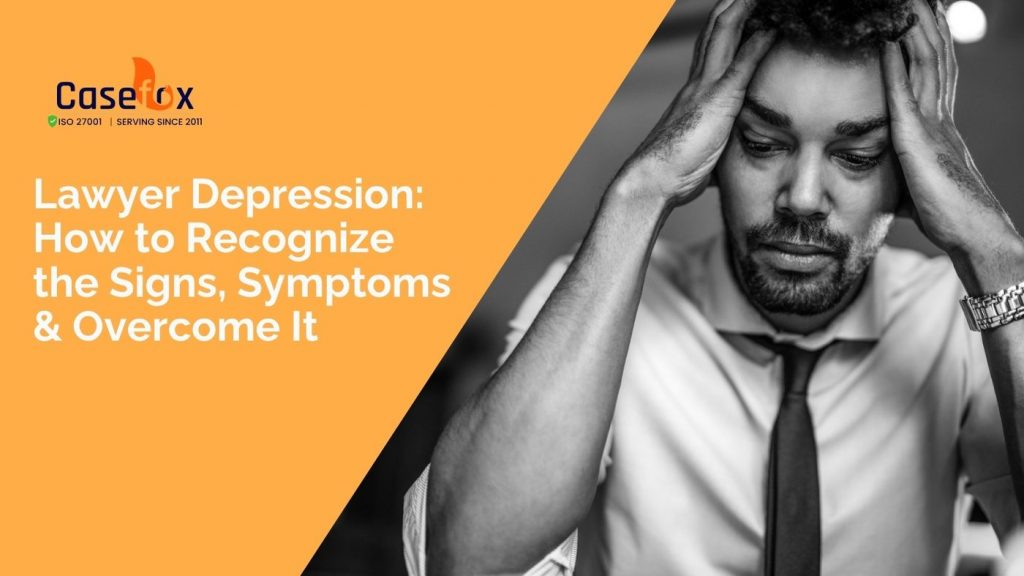Lawyer Depression: How to Recognize the Signs, Symptoms & Overcome It

We don’t talk about it in the partners’ meetings. We don’t mention it during court recess or while grabbing coffee between hearings. But every lawyer knows that feeling — the one where the case files on your desk don’t just look overwhelming; they feel like they’re physically pressing down on your chest. The phone rings, and your stomach twists. You read the same paragraph in a deposition over and over again, but none of it sticks.
This isn’t a blog filled with statistics or clinical studies. It’s not about throwing facts at you or diagnosing from afar. In this blog, we’re going to talk honestly about lawyer depression — what it really looks like, how to recognize the signs in yourself or a colleague, and how to begin the process of healing. You’ll find reflections you might relate to, gentle reminders that you’re not alone, and steps you can take when everything starts to feel too heavy. Because behind the polished suits and sharp minds are human beings, and it’s time we talked about how they’re really doing.
The Silent Struggle Every Lawyer Knows – Signs Being Ignored
Remember your first day practicing? That mix of terror and excitement? Fast forward to now, when did the scales tip so far toward dread? It creeps up on you:
The fifth cancelled dinner with friends in a row, that bottle of scotch that empties faster these days, the way you snap at your paralegal over typos you’d have shrugged off last year.
We tell ourselves it’s just stress, just a rough patch. But when the rough patch becomes the road, it’s time to acknowledge what’s really going on.

Recognizing the Signs and Symptoms
Lawyers are terrible patients, especially when we’re the patient. Watch for these red flags in a lawyer you would think is under constant stress:
In the Office:
Your desk looks like a paper bomb went off, and you can’t muster the energy to care
Simple tasks feel huge, drafting that basic motion seems as tiresome as arguing.
You fantasize about quitting during every deposition
Small Lifelines for When You’re Drowning
You don’t need to quit your job or check into rehab to start feeling better. Try these tiny rebellions against legal culture:
1. The 5-5-5 Rule
When overwhelmed, ask:
Will this matter in 5 days?
5 months?
5 years?
Most of what keeps us up at night won’t survive the second question.

2. Reclaim Your Lunch Break
Actual lunch. Away from your desk. Without your phone. It’s not radical, it’s what normal humans do.
3. Find Your People
That colleague who seems equally disillusioned? The one who rolls their eyes at the same absurd firm policies? Have a real conversation with them. You’ll both feel less alone.
When the Gavel Feels Heavy: A Lawyer’s Guide Through the Fog
You’re staring at your third amended complaint when suddenly the text blurs not from fatigue, but from that quiet voice whispering, “Why does this feel so much harder than it should?”
What Your Body’s Been Trying to Tell You
Your clenched jaw isn’t normal. That mysterious stomachache before client meetings isn’t about the bad courthouse coffee, it’s your nervous system waving red flags. Our bodies keep score in ways our busy minds ignore until the symptoms become impossible to dismiss.
The Lies We Tell Ourselves
“I’ll take a real vacation after this case wraps” (knowing full well another will take its place). “This is just how practicing law feels” (as if suffering is some badge of honor). The most dangerous one: “I can tough it out alone” (while our personal lives quietly crumble). These aren’t truths, they’re survival mechanisms that stopped working, but we keep using them anyway.
Small Acts of Rebellion That Help
Leaving the office before dark, even when your inbox screams otherwise. Taking a full lunch break where you actually taste your food instead of inhaling a sandwich while proofreading. Calling a colleague just to say, “This case is killing me too,” instead of pretending everything’s fine. These tiny acts of defiance against legal culture’s unreasonable demands are how we begin reclaiming ourselves.
How to Cope, Heal, and Move Forward
When You Notice a Colleague Drowning
It’s in the way their usually sharp filings have gotten sloppy. They’ve started volunteering for every weekend deposition like they’re trying to escape something. The right question isn’t “How are you? “No, really, how is this season treating you?” followed by actual listening. Sometimes the bravest thing we can do is say first, “I’m not okay either.”
What Getting Better Looks Like
Progress isn’t waking up suddenly cured. It’s noticing small shifts: catching negative self-talk before it spirals. Setting one boundary and keeping it. Recognizing when you need a mental health day without guilt. Some days, “better” just means getting out of bed and showing up. Other days, it’s finally admitting you need help. Both count.

When to Get Serious About Help
If this type of experience is part of your daily routine:
- Using alcohol to sleep or “take the edge off” regularly
- Fantasizing about crashing your car to get a break from work
- Feeling numb even during wins that should matter
- Colleagues expressing concern (we’re usually the last to notice)
Therapy doesn’t mean you’re broken, it means you’re smart enough to get expert help with your problems, just like you’d advise a client to do.
A New Way to Measure Success
What if we judged our careers by different metrics?
- Not just cases won, but nights slept well
- Not just client compliments, but real connections maintained
- Not just income earned, but joy preserved
The best lawyers aren’t those who sacrifice everything, they’re the ones who last.
The Truth No One Tells You in Law School
Being a good lawyer doesn’t require destroying yourself. In fact, the colleagues who set boundaries, who prioritize their health, who allow themselves to be human? They’re often the ones still practicing decades later.
The next time you’re in court, look around. Half the room is fighting the same silent battle. The difference between surviving and thriving might just be who’s brave enough to say it first.
So let’s start saying it. Let’s start admitting when the gavel feels too heavy to lift. Because the first rule of advocacy is knowing when to ask for help, and that applies to ourselves, too.
You became a lawyer to fight for others. It’s time to fight for yourself, too.
The Hidden Costs of Our ‘Always On’ Culture
It’s not just missed birthdays and anniversaries. It’s about actively being in the role of a strategic mindset and thinking from a lawyer’s perspective. It’s realizing you haven’t read a book for pleasure since law school. That moment when you can’t remember what you used to enjoy before the law consumed everything. These aren’t sacrifices, they’re thefts we’ve been conditioned to accept.
The Moments When It Hits Hardest
It’s never during the big trials or negotiations. The weight comes in the quiet moments: when your hands won’t stop shaking before a routine motion hearing. When you catch yourself daydreaming about missing a filing deadline, just to make the pressure stop. That Sunday afternoon, when your chest tightens knowing tomorrow means another week of pretending you’ve got it all together.
Practical Survival Tactics for Impossible Weeks
When everything’s on fire, try the “good enough” standard: filings don’t need to be perfect, just timely. Keep emergency snacks in your desk drawer because low blood sugar makes everything worse. Sometimes getting through the day means lowering the bar to where you can actually reach it.

The Unexpected Gifts of Prioritizing Yourself
Here’s the secret no one tells you: taking care of yourself makes you better at your job. Clearer thinking during negotiations. More patience with difficult clients. Creative solutions that don’t come from exhausted brains. The legal system won’t change overnight, but we can change how we move through it—one small act of self-preservation at a time.